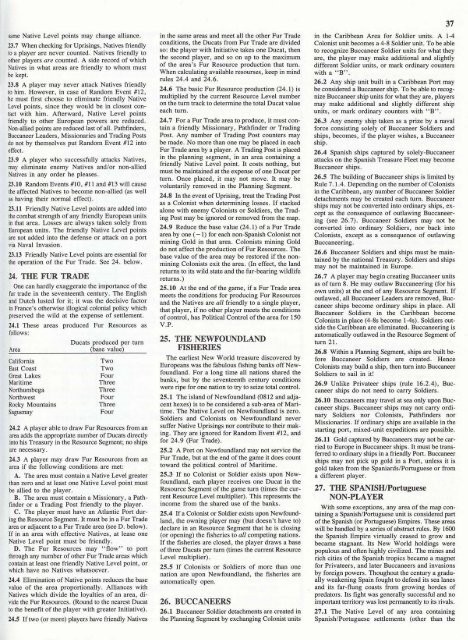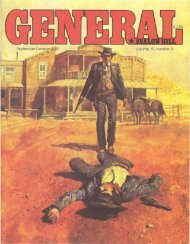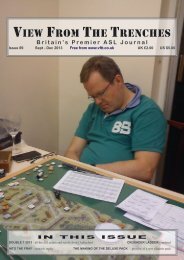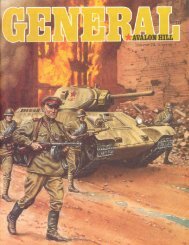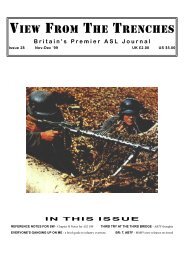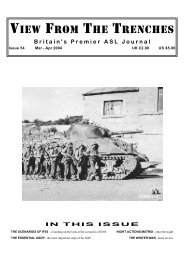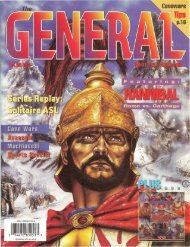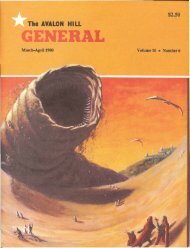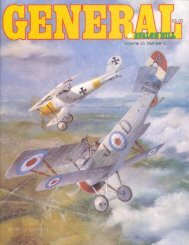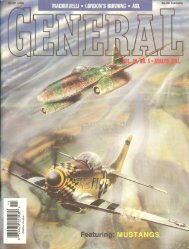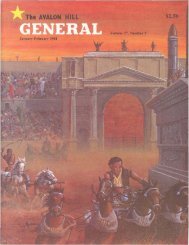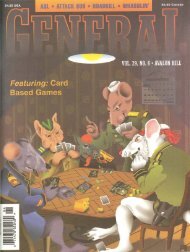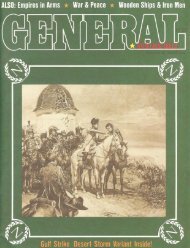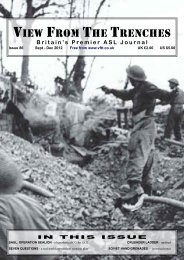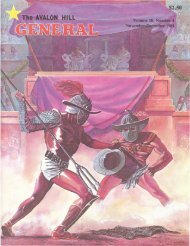general - View From The Trenches
general - View From The Trenches
general - View From The Trenches
- TAGS
- trenches
- www.vftt.co.uk
You also want an ePaper? Increase the reach of your titles
YUMPU automatically turns print PDFs into web optimized ePapers that Google loves.
same Native Level points may change alliance.<br />
23.7 When checking for Uprisings, Natives friendly<br />
to a player are never counted. Natives friendly to<br />
other players are counted. A side record of which<br />
Natives in what areas are friendly to whom must<br />
be kept.<br />
23.8 A player may never attack Natives friendly<br />
to him. However, in case of Random Event #12,<br />
he must first choose to eliminate friendly Native<br />
Level points, since they would be in closest contact<br />
with him. Afterward, Native Level points<br />
friendly to other European powers are reduced.<br />
Non-allied points are reduced last ofall. Pathfinders,<br />
Buccaneer Leaders, Missionaries and Trading Posts<br />
do not by themselves put Random Event #12 into<br />
effect.<br />
23.9 A player who successfully attacks Natives,<br />
may eliminate enemy Natives and/or non-allied<br />
Natives in any order he pleases.<br />
23.10 Random Events #10, #11 and #13 will cause<br />
the affected Natives to become non-allied (as well<br />
as having their normal effect).<br />
23.11 Friendly Native Level points are added into<br />
the combat strength of any friendly European units<br />
in that area. Losses are always taken solely from<br />
European units. <strong>The</strong> friendly Native Level points<br />
are not added into the defense or attack on a port<br />
via Naval Invasion.<br />
23.13 Friendly Native Level points are essential for<br />
the operation of the Fur Trade. See 24. below.<br />
24. THE FUR TRADE<br />
One can hardly exaggerate the importance of the<br />
fur trade in the seventeenth century. <strong>The</strong> English<br />
and Dutch lusted for it; it was the decisive factor<br />
in France's otherwise illogical colonial policy which<br />
preserved the wild at the expense of settlement.<br />
24.1 <strong>The</strong>se<br />
follows:<br />
areas produced Fur Resources as<br />
Area<br />
Ducats produced per turn<br />
(base value)<br />
California<br />
East Coast<br />
Great Lakes<br />
Maritime<br />
Northumbega<br />
Northwest<br />
Rocky Mountains<br />
Saguenay<br />
Two<br />
Two<br />
Four<br />
Three<br />
Three<br />
Four<br />
Three<br />
Four<br />
24.2 A player able to draw Fur Resources from an<br />
area adds the appropriate number of Ducats directly<br />
into his Treasury in the Resource Segment; no ships<br />
are necessary.<br />
24.3 A player may draw Fur Resources from an<br />
area if the following conditions are met:<br />
A. <strong>The</strong> area must contain a Native Level greater<br />
than zero and at least one Native Level point must<br />
be allied to the player.<br />
B. <strong>The</strong> area must contain a Missionary, a Pathfinder<br />
or a Trading Post friendly to the player.<br />
C. <strong>The</strong> player must have an Atlantic Port during<br />
the Resource Segment. It must be in a Fur Trade<br />
area or adjacent to a Fur Trade area (see D. below).<br />
If in an area with effective Natives, at lease one<br />
Native Level point must be friendly.<br />
D. <strong>The</strong> Fur Resources may "flow" to port<br />
through any number of other Fur Trade areas which<br />
contain at least one friendly Native Level point, or<br />
which have no Natives whatsoever.<br />
24.4 Elimination of Native points reduces the base<br />
value of the area proportionally. Alliances with<br />
Natives which divide the loyalties of an area, divide<br />
the Fur Resources. (Round to the nearest Ducat<br />
to the benefit of the player with greater Initiative).<br />
24.5 Iftwo (or more) players have friendly Natives<br />
in the same areas and meet all the other Fur Trade<br />
conditions, the Ducats from Fur Trade are divided<br />
so: the player with Initiative takes one Ducat, then<br />
the second player, and so on up to the maximum<br />
of the area's Fur Resource production that turn.<br />
When calculating available resourses, keep in mind<br />
rules 24.4 and 24.6.<br />
24.6 <strong>The</strong> basic Fur Resource production (24.1) is<br />
multiplied by the current Resource Level number<br />
on the turn track to determine the total Ducat value<br />
each turn.<br />
24.7 For a Fur Trade area to produce, it must contain<br />
a friendly Missionary, Pathfinder or Trading<br />
Post. Any number of Trading Post counters may<br />
be made. No more than one may be placed in each<br />
Fur Trade area by a player. A Trading Post is placed<br />
in the planning segment, in an area containing a<br />
friendly Native Level point. It costs nothing, but<br />
must be maintained at the expense of one Ducat per<br />
turn. Once placed, it may not move. It may be<br />
voluntarily removed in the Planning Segment.<br />
24.8 In the event of Uprising, treat the Trading Post<br />
as a Colonist when determining losses. If stacked<br />
alone with enemy Colonists or Soldiers, the Trading<br />
Post may be ignored or removed from the map.<br />
24.9 Reduce the base value (24.1) of a Fur Trade<br />
area by one (-1) for each non-Spanish Colonist not<br />
mining Gold in that area. Colonists mining Gold<br />
do not affect the production of Fur Resources. <strong>The</strong><br />
base value of the area may be restored if the nonmining<br />
Colonists exit the area. (In effect, the land<br />
returns to its wild state and the fur-bearing wildlife<br />
returns.)<br />
25.10 At the end of the game, if a Fur Trade area<br />
meets the conditions for producing Fur Resources<br />
and the Natives are all friendly to a single player,<br />
that player, if no other player meets the conditions<br />
of control, has Political Control ofthe area for 150<br />
V.P.<br />
25. THE NEWFOUNDLAND<br />
FISHERIES<br />
<strong>The</strong> earliest New World treasure discovered by<br />
Europeans was the fabulous fishing banks offNewfoundland.<br />
For a long time all nations shared the<br />
banks, but by the seventeenth century conditions<br />
were ripe for one nation to try to seize total control.<br />
25.1 <strong>The</strong> island of Newfoundland (0812 and adjacent<br />
hexes) is to be considered a sub-area of Maritime.<br />
<strong>The</strong> Native Level on Newfoundland is zero.<br />
Soldiers and Colonists on Newfoundland never<br />
suffer Native Uprisings nor contribute to their making.<br />
<strong>The</strong>y are ignored for Random Event #12, and<br />
for 24.9 (Fur Trade).<br />
25.2 A Port on Newfoundland may not service the<br />
Fur Trade, but at the end of the game it does count<br />
toward the political control of Maritime.<br />
25.3 If no Colonist or Soldier exists upon Newfoundland,<br />
each player receives one Ducat in the<br />
Resource Segment of the game turn (times the current<br />
Resource Level multiplier). This represents the<br />
income from the shared use of the banks.<br />
25.4 Ifa Colonist or Soldier exists upon Newfoundland,<br />
the owning player may (but doesn't have to)<br />
declare in an Resource Segment that he is closing<br />
(or opening) the fisheries to all competing nations.<br />
If the fisheries are closed, the player draws a base<br />
ofthree Ducats per turn (times the current Resource<br />
Level multiplier).<br />
25.5 If Colonists or Soldiers of more than one<br />
nation are upon Newfoundland, the fisheries are<br />
automatically open.<br />
26. BUCCANEERS<br />
26.1 Buccaneer Soldier detachments are created in<br />
the Planning Segment by exchanging Colonist units<br />
37<br />
in the Caribbean Area for Soldier units. A 1-4<br />
Colonist unit becomes a 4-8 Soldier unit. To be able<br />
to recognize Buccaneer Soldier units for what they<br />
are, the player may make additional and slightly<br />
different Soldier units, or mark ordinary counters<br />
with a "B".<br />
26.2 Any ship unit built in a Caribbean Port may<br />
be considered a Buccaneer ship. To be able to recognize<br />
Buccaneer ship units for what they are, players<br />
may make additional and slightly different ship<br />
units, or mark ordinary counters with "B".<br />
26.3 Any enemy ship taken as a prize by a naval<br />
force consisting solely of Buccaneer Soldiers and<br />
ships, becomes, if the player wishes, a Buccaneer<br />
ship.<br />
26.4 Spanish ships captured by solely-Buccaneer<br />
attacks on the Spanish Treasure Fleet may become<br />
Buccaneer ships.<br />
26.5 <strong>The</strong> building of Buccaneer ships is limited by<br />
Rule 7. 1.4. Depending on the number of Colonists<br />
in the Caribbean, any number ofBuccaneer Soldier<br />
detachments may be created each turn. Buccaneer<br />
ships may not be converted into ordinary ships, except<br />
as the consequence of outlawing Buccaneering<br />
(see 26.7). Buccaneer Soldiers may not be<br />
converted into ordinary Soldiers, nor back into<br />
Colonists, except as a consequence of outlawing<br />
Buccaneering.<br />
26.6 Buccaneer Soldiers and ships must be maintained<br />
by the national Treasury. Soldiers and ships<br />
may not be maintained in Europe.<br />
26.7 A player may begin creating Buccaneer units<br />
as of turn 8. He may outlaw Buccaneering (for his<br />
own units) at the end of any Resource Segment. If<br />
outlawed, all Buccaneer Leaders are removed, Buccaneer<br />
ships become ordinary ships in place. All<br />
Buccaneer Soldiers in the Caribbean become<br />
Colonists in place (4-8s become 1-4s). Soldiers outside<br />
the Caribbean are eliminated. Buccaneering is<br />
automatically outlawed in the Resource Segment of<br />
turn 21.<br />
26.8 Within a Planning Segment, ships are built before<br />
Buccaneer Soldiers are created. Hence<br />
Colonists may build a ship, then turn into Buccaneer<br />
Soldiers to sail in it!<br />
26.9 Unlike Privateer ships (rule 16.2.4), Buccaneer<br />
ships do not need to carry Soldiers.<br />
26.10 Buccaneers may travel at sea only upon Buccaneer<br />
ships. Buccaneer ships may not carry ordinary<br />
Soldiers nor Colonists, Pathfinders nor<br />
Missionaries. If ordinary ships are available in the<br />
starting port, mixed-unit expeditions are possible.<br />
26.11 Gold captured by Buccaneers may not be carried<br />
to Europe in Buccaneer ships. It must be transferred<br />
to ordinary ships in a friendly Port. Buccaneer<br />
ships may not pick up gold in a Port, unless it is<br />
gold taken from the Spaniards/Portuguese or from<br />
a different player.<br />
27. THE SPANISH/Portuguese<br />
NON-PLAYER<br />
With some exceptions, any area of the map containing<br />
a Spanish/Portuguese unit is considered part<br />
of the Spanish (or Portuguese) Empires. <strong>The</strong>se areas<br />
will be handled by a series of abstract rules. By 1600<br />
the Spanish Empire virtually ceased to grow and<br />
became stagnant. Its New World holdings were<br />
populous and often highly civilized. <strong>The</strong> mines and<br />
rich cities of the Spanish tropics became a magnet<br />
for Privateers, and later Buccaneers and invasions<br />
by foreign powers. Thoughout the century a gradually<br />
weakening Spain fought to defend its sea lanes<br />
and its far-flung coasts from growing hordes of<br />
predators. Its fight was <strong>general</strong>ly successful and no<br />
important territory was lost permanently to its rivals.<br />
27.1 <strong>The</strong> Native Level of any area contammg<br />
Spanish/Portuguese settlements (other than the


